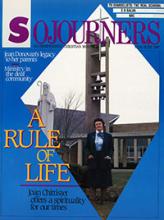ON THE WAY to Jerusalem Jesus was passing along between Samaria and Galilee. And as be entered a village, he was met by ten lepers, who stood at a distance and lifted up their voices and said, "Jesus, Master, have mercy on us." When he saw them he said to them, "Go and show yourselves to the priests." And as they went they were cleansed.
Then one of them, when he saw that he was healed, turned back, praising God with a loud voice; and he fell on his face at Jesus' feet, giving him thanks. Now he was a Samaritan. Then said Jesus, "Were not ten cleansed? Where are the nine? Was no one found to return and give praise to God except this foreigner?" And he said to him, "Rise and go your way; your faith has made you well. " - Luke 17:11-19
TWELVE YEARS AGO, on an October afternoon, I was on a bus heading from Lewiston, Maine, where I went to college, to Boston, where I was going to catch a plane to Pennsylvania to my grandfather's funeral. The scripture from Luke brings that day to my memory.
I remember very sharply the feelings of grief and loss I was experiencing; my grandfather's death was the first major loss in my life. I was feeling very alone, which wasn't difficult, because there were only three other people on that bus. And I was feeling very sorry for myself on that long, three-hour bus ride.
The bus stopped about an hour outside of Boston, and a woman got on - a woman I will never forget. She was in her 70s, and she had a shock of bright, white hair, on top of which sat a red, knit stocking cap. She looked around the bus and saw 38 empty seats, then came right over to where I was sitting and sat next to me. She plopped herself down and said, "Praise God - what a beautiful day!"
Read the Full Article

